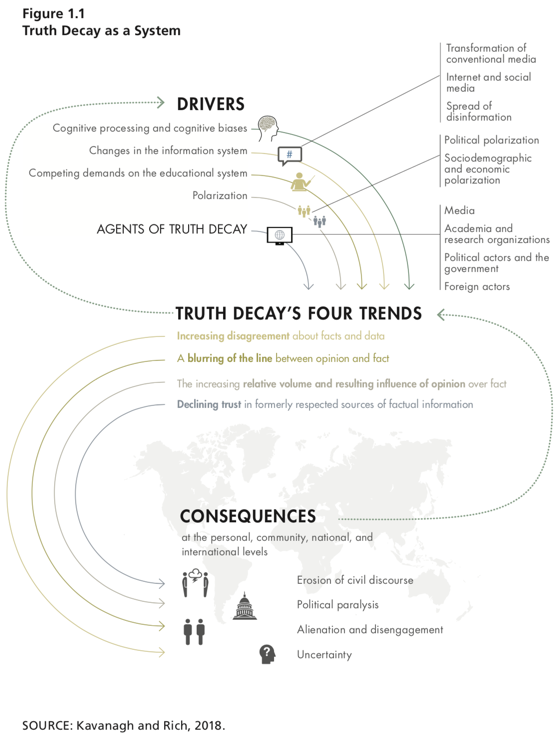New Report from RAND: “Exploring Media Literacy Education as a Tool for Mitigating Truth Decay”
From RAND:
Truth Decay — the diminishing role that facts, data, and analysis play in political and civil discourse — appears to result, in part, from an increasingly complex information ecosystem. Technology, in particular, offers continual access to information of varying quality and credibility, information that can blur the line between fact-based evidence and opinion. Not everyone is equipped with the skills necessary to navigate such uncertain terrain.
The purpose of this report is to describe the field of media literacy (ML) education and the ways in which ML education can counter Truth Decay by changing how participants consume, create, and share information.
One limitation of this research base arises from the variety of ways that literature defines and measures ML outcomes; while a multiplicity of viewpoints can be beneficial, it also presents challenges in terms of aggregating findings across studies. Despite this, the authors describe existing evidence that ML could be a useful tool for combating Truth Decay. They also provide an inventory of ML offerings available to the public.Finally, the authors make suggestions for moving forward, with the specific recommendation that professionals in ML and related fields strengthen their communication and collaboration, considering where there are opportunities for a common approach to researching ML. The authors recommend that policymakers and practitioners increase participation from diverse constituencies in scaling ML efforts.
Key Findings
The term media literacy can refer to many different fields and competencies
- ML encompasses a variety of interrelated disciplines, such as information literacy, news literacy, digital literacy, science literacy, visual literacy, and others.
- ML is traditionally defined as a set of specific competencies: the abilities to access, analyze, evaluate, and communicate media messages in a variety of forms. However, the ways that these competencies are framed varies across fields.
Past research suggests ML can influence information consumption and creation behaviors, but causal evaluative research is lacking
- Studies that have been conducted vary widely in how they have defined and measured ML competencies. This makes it difficult to aggregate across studies over time.
- Past research has identified some evidence that ML increases participant resiliency to disinformation and is able to change the way participants consume, create, and share information. However, there is little causal, evaluative research in the ML field that isolates the effects of ML interventions.
- More research needs to be done to identify measures that best assess complex ML competencies and how, when, and what types of ML education are most effective.
ML Resources are Comprehensive and Varied
- An online appendix to this report contains a list of ML interventions, curricula, and other resources focused specifically on news literacy and information literacy.
- This database is intended to provide a centralized location for information about such resources and give interested stakeholders a means for comparing them across multiple dimensions.
- Currently available programs are diverse in terms of format, delivery method, and audience.
Recommendations
- Researchers in ML and related fields should strengthen interdisciplinary communication and collaboration.
- Policymakers and practitioners should increase participation from diverse constituencies in scaling ML effort
Direct to Complete Summary
Direct to Full Text Report
163 pages; PDF. ||| Read Report Online
Direct to Data File (.zip/.xls)
Direct to Truth Decay Project Website
Filed under: Data Files, News
About Gary Price
Gary Price (gprice@gmail.com) is a librarian, writer, consultant, and frequent conference speaker based in the Washington D.C. metro area. He earned his MLIS degree from Wayne State University in Detroit. Price has won several awards including the SLA Innovations in Technology Award and Alumnus of the Year from the Wayne St. University Library and Information Science Program. From 2006-2009 he was Director of Online Information Services at Ask.com.



